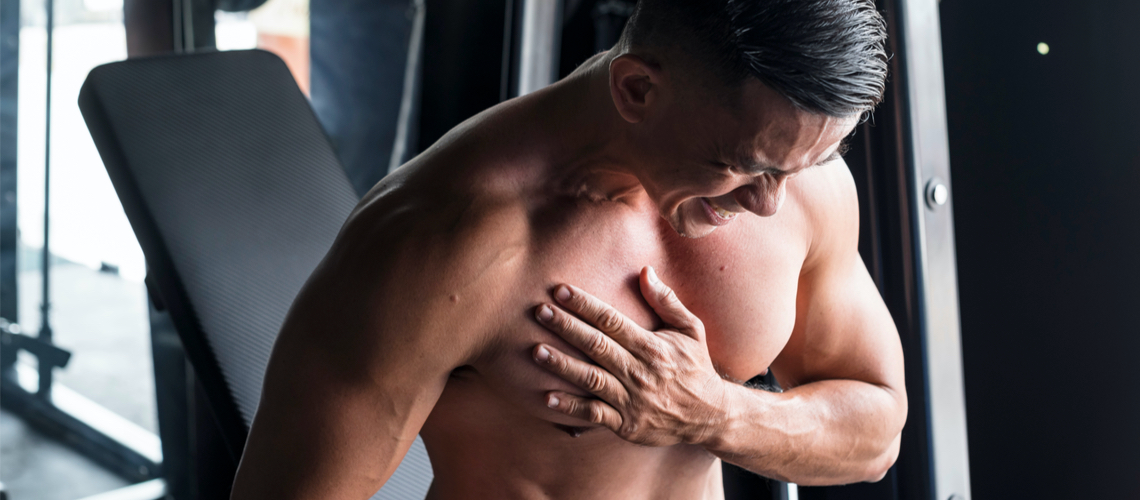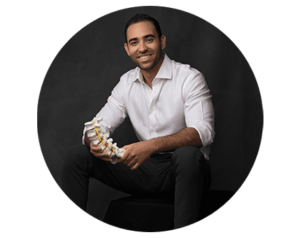There are three layers of intercostal muscles in the chest. Intercostal muscles are muscle groups situated between the ribs which allow for movement of the chest wall. These muscles are responsible for stabilizing the upper body and aiding in the breathing process. The three layers are known as the external, internal, and innermost intercostal muscles. The pectoralis major muscles – otherwise known as the “pecs” or “breast” from the latin – are powerful, thick and often described as “fan-shaped” muscles. These muscles consist of two portions: the clavicular and the sternal. The pecs are what allow arms to rotate inward and move closer to the body as well as helping to move arms both forward or backward.
Almost 49 percent of chest pain stems from intercostal muscle strain. Strained or “pulled” muscles of the chest cause sharp pains. In a muscle strain, the muscle may be either stretched or, even, torn. Though injuries to the pectoralis major are relatively uncommon, they often result in significant disability and a decline in the function of the shoulder. These injuries range from bruising and inflammation to complete tears. Ruptures are even more uncommon, however, a recent study shows an uptick. Out of 365 cases of pectoralis major ruptures reported from the years 1822 to 2010, 76% have happened in the past 20 years.
Though these types of tears are mostly found in the young athletic male due to weight-lifting, they also affect older athletes who do not warm-up properly or even in the elderly. Any activity where the arm is extended and externally rotated while contracting can cause tears – most occur near the tendon.
Dr. Anijar and the staff at South Beach, Miami and Aventura’s Spine and Wellness Centers of America (SWCA), brings a multidisciplinary interventional pain medicine approach built around a highly-trained team of physical therapists, surgeons and physiatrists. Patients suffering from chest muscle injury have an array of treatment options to choose from to quickly and safety rehabilitate them back to optimal healthful function.
Each patient receives a customized treatment plan based on their particular diagnosis with some options including physical therapy including cold therapy and exercises to foster strengthening and stretching. In most cases, there is no better way to treat torn shoulder muscles and tendons than with Regenerative Therapy which uses your own cells to regenerate new tissue. It is a great way to turn back the clock and restore a youthful energy to your tendons.
Regenerative Therapy, such as stem cell therapy, is an option available to patients of Dr. Anijar. A former professional football player recently had success recovering from a major tear of his pectoralis major muscle. Four weeks on from the initial regenerative therapy treatment, the patient has recovered almost his full range of motion and will make a significant recovery back to where he was before the injury.
Chest Muscle Injury Symptoms include:
Pain, bruising, swelling/inflammation, stiffness, weakness, numbness potentially deformity of the chest and upper arm. In addition to reduced range of motion, pain is either localized or may radiate to the upper arm and neck area.
Diagnosis of Chest Muscle Injuries
In order to make a diagnosis, a physical exam may be difficult to perform due to pain and swelling. Post-swelling, both chest and shoulder may have an abnormal appearance. Other tests would include testing the strength of the muscle and muscle mass. Imaging tests such as X-rays, MRI, CT, and Ultrasound can all be used to help doctors confirm chest muscle injury.
Though pectoral strains are most commonly grade 2 tears, see the table below for the full scale of injury:
Grade 1: a small number of fibers are torn – still allowing for full function of the chest muscles.
Grade 2: a larger number of fibers are torn resulting in moderate loss of function of the chest muscles.
Grade 3: All the muscle fibers have ruptured resulting in a major loss of function of the chest muscles.
Dr. Anijar and team are proficient at diagnosing and treating specialty conditions like muscle strains and tears with the most up-to-date treatments in a state-of-the-art facility. Returning patients to their previous form and/or their optimum health is the mission of world-class physicians such as Dr. Anijar. The opportunity of working alongside Dr. Matthew Cooper DC, CCSP and the USA Sports Medicine team opens the door to a myriad of services that complement one another. Miami’s top sports and regenerative medicine facility, offers world-class physical therapy and chiropractic services.


